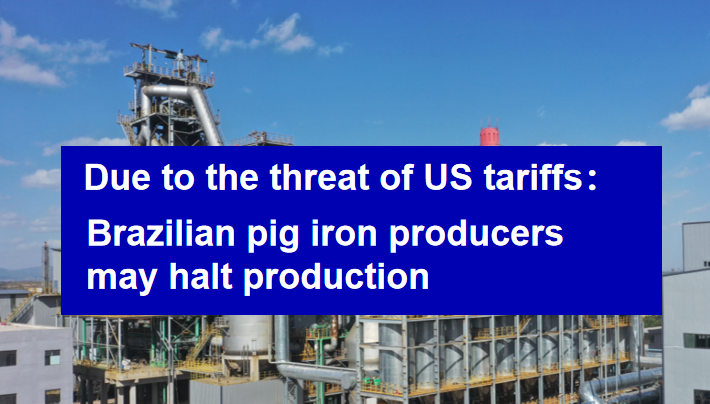Due to the threat of US tariffs, Brazilian pig iron producers may halt production
2025-08-05 14:59:13 hits:0

In the current era of constant global trade fluctuations, the US tariff policy has once again sent shockwaves through industrial chains. This time, Brazilian iron - ore producers find themselves at the epicenter of this trade tempest, facing an unprecedented production - halt crisis.
US Tariff Threat: A Sudden Slam on the Demand Brakes
The United States, as the largest buyer of Brazilian iron ore, wields significant influence over the Brazilian iron - ore industry. Previously, US President Trump threatened to impose a 50% tariff on Latin American countries starting August 1. This news was like a bombshell, instantly causing turmoil in the Brazilian iron - ore market. The potential tariff imposition has made US customers more cautious about purchasing Brazilian iron ore, directly leading to a sharp decline in demand.
For Brazilian iron - ore producers, the drop in demand from US customers is akin to an unexpected and harsh winter, throwing their previously stable production and operations into disarray. Without sufficient market demand to sustain them, enterprises are struggling to keep production going, and the specter of production halts looms large over every producer.
Enterprises in Distress: Production Halt as the Last Resort
In this crisis triggered by US tariffs, Brazilian iron - ore producers are all in dire straits, with many on the brink of halting production.
Modulax serves as a typical case. Geraldo Basques, the company's CEO, said in an interview with a sense of helplessness that due to trade - related concerns, the company will cease operations next week and plans maintenance work later in the year. What's even more concerning is that he stated bluntly, "We have no resumption date." This means that once production stops, there's great uncertainty about when Modulax will be able to resume, and the company's future is shrouded in uncertainty.
Modulax's rival, Css Siderurgica Setelagoana, hasn't been spared either. In an email statement, the company revealed that while waiting for the tariff situation to clear up, it's operating on its raw - material inventory. However, raw - material inventory is finite. Once it's depleted, the company may be forced to halt production. This "wait - and - see" approach reflects the powerlessness and struggle of enterprises in the face of US tariff threats.
Collateral Damage: Trade Storm Wreaks Havoc on the Industrial Ecosystem
The US threat to impose high tariffs on iron ore from Latin American countries is not just a direct hit on Brazilian iron - ore producers but also a severe blow to the entire industrial chain ecosystem.
Upstream, the production halt or reduction of iron - ore producers will lead to a drop in orders for raw - material suppliers, affecting their production and income. Many small raw - material enterprises that rely on iron - ore production may face survival crises and could even go out of business.
In the mid - stream, since iron ore is a crucial raw material for steel production, its reduced supply will disrupt the production plans of steel enterprises. Steel companies may have to adjust their production scales and seek alternative raw materials, which will undoubtedly increase production costs and difficulties.
Downstream, the reduced supply of steel products will impact numerous industries such as construction, automotive, and machinery manufacturing, which have a huge demand for steel. Once there are issues with steel supply, it will lead to project delays, increased production costs, and other problems, thereby affecting the stable operation of the entire economy.
Charting a Course Out: Longing for Trade Peace
Faced with the difficulties brought about by US tariff threats, Brazilian iron - ore producers cannot afford to be passive and must actively seek solutions. On the one hand, enterprises can strengthen communication and negotiation with US customers to reach a consensus on tariff issues and stabilize market demand. On the other hand, they can expand into other international markets, reduce their dependence on the US market, and lower trade risks.
At the same time, the international community should work together to promote trade liberalization and the multilateral trading system. Trade disputes should be resolved through dialogue and negotiation to prevent unilateralism and trade protectionism from damaging global industrial and supply chains. Only in a fair, just, and open trade environment can enterprises from all countries achieve mutual benefit and win - win results and jointly drive the development of the global economy.
The production - halt crisis of Brazilian iron - ore producers under the US tariff threat is a microcosm of the current rise of global trade protectionism. This crisis not only tests the resilience of the Brazilian iron - ore industry but also sounds an alarm for the stability of the global trade order. It is hoped that all parties can work together to resolve trade conflicts and restore global trade to a healthy development path.
About Tiegu
As an iron - ore supplier from China, Tiegu has built a solid reputation and a customer base in the international market with its stable product quality, reasonable prices, and a well - established supply chain system. With Brazilian iron ore's market share in the United States shrinking significantly due to tariffs, US customers will inevitably look for new suppliers to meet their needs. Tiegu can seize this opportunity to actively expand into the US market, strengthen communication and cooperation with US customers, provide high - quality products and services, and fill the market gap left by Brazilian iron ore.
At the same time, Tiegu can also strengthen cooperation with other countries affected by US tariffs, such as Brazil. By establishing strategic partnerships, they can jointly tackle the challenges of trade protectionism and achieve mutual benefit and win - win results. For example, Tiegu can offer technical support and production experience to Brazilian enterprises to help them improve production efficiency and product quality, reduce production costs, and enhance their competitiveness in the international market. Brazilian enterprises, in turn, can leverage their local market channels and resource advantages to assist Tiegu in expanding into the South American market.
Contact Us
WhatsApp: 15256135588 (First 10 inquiries receive extra gifts)
E-mail:zbw@tiegu.net
Apply for Pilot: Click the link to get a customized solution (First batch of customers enjoy 20% discount)
Blog Author Profile
DAWN | Pig Iron & Castings Procurement Advisor 18 years in the foundry trenches give me an edge: I know how pig iron’s chemistry impacts casting quality and can troubleshoot defects like cracks and porosity. With a 1M MT/year pig iron and 60k MT/year casting output from our in-house factory, plus 200+ verified suppliers on our platform, we offer fast price comparisons. Expect a 24-hour inquiry response—my goal? Not just closing deals, but being your go-to partner in the foundry world.
18 years in the foundry trenches give me an edge: I know how pig iron’s chemistry impacts casting quality and can troubleshoot defects like cracks and porosity. With a 1M MT/year pig iron and 60k MT/year casting output from our in-house factory, plus 200+ verified suppliers on our platform, we offer fast price comparisons. Expect a 24-hour inquiry response—my goal? Not just closing deals, but being your go-to partner in the foundry world.

 en
en  fra
fra  de
de  ru
ru  ara
ara  gle
gle  it
it  jp
jp  kor
kor  th
th  zh
zh 


